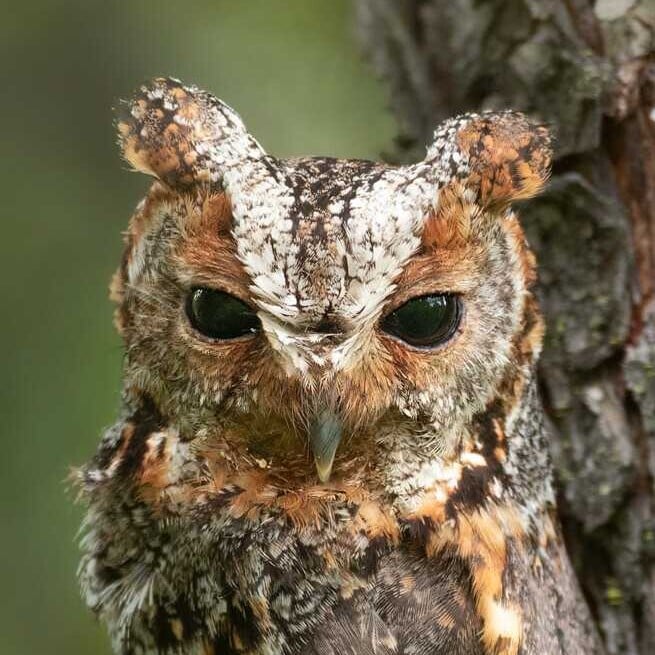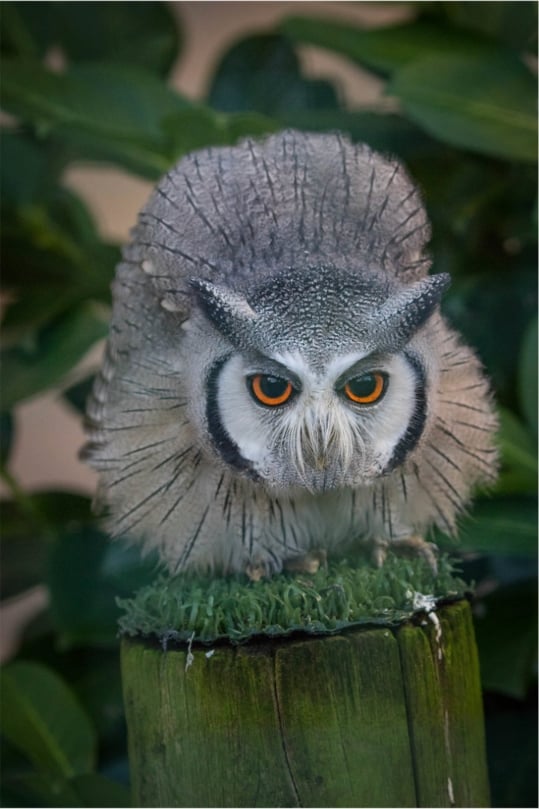The delicate feathers of a Barn Owl’s ear.
To get some nifty quick facts about owl hearing, click here to see the Barn Owl Trust’s page on that, and it is also the source of this image. For a much more in depth look at some of the owl’s amazing abilities, read on!
This summary is of “Barn owls have ageless ears,” by Bianca Krumm, Georg Klump, Christine Köppl, and Ulrike Langemann (2017). This is my best interpretation of their study and findings. I’m not a scientist, just a hobbyist, so feel free to browse the source provided and correct me if I’ve gotten anything incorrect.
Time for another look at another amazing bit of owl research!
In this paper, the researchers looked into owls as creatures with amazing hearing, to see how their hearing changes with age. I will go over some of their testing and findings to try to break down what they did and what was learned. As always, this is not my area of expertise, so if you do understand this well and are curious, please take a look at the full paper and fill me in on what I misunderstood.
The National Council on Aging says that 1/3 of people ages 65-74 and 1/2 of those 75 and older suffer from hearing loss. Mammals as a whole suffer from presbycusis, age related hearing loss due to changes in the inner ear structures. Birds, while having different, but functionally similar ear structures, do not seem to suffer from these effects.
Mammalian presbycusis is associated with progressive damage to the loss of hair cells inside the corti, an organ of the cochlea, the spiral shaped part of your inner ear. This is a very small structure, so I’ve included a picture of the cochlea, a picture of the tiny hairs we’ll be discussing, and a 3D printed cochlea to give a size perspective. I then also have a Barn Owl cochlea picture.




These tiny hairs are responsible for mechanoelectrical transduction of sound. That is a process that turns vibrational energy from sound waves into an electrical signal in the nerves of the cochlea which your brain can interpret as sound. Click this link for a brief article on mechanoelectrical transduction.
Humans and most mammals have partial regeneration of the hair cells of the inner ear, but they cannot replace these sound sensing hairs in the cochlea. Some other vertebrates, birds in particular, have been studied for some time as they can regenerate their basilar papillae, the structure in birds that serves the same purpose as the corti do in mammals.
Prior studies of the basilar papillae have shown amazing regenerative properties of the sensory hairs. Many species have been looked at showing a lack of age-related damage, and even in experiments where chemicals were applied directly to damage the hair cells experienced very quick recovery and growth of new hairs. As long as the hair growing cells themselves are not damaged, the hairs can grow back when damaged from age or by physical trauma.
Most hearing loss in mammals occurs at higher frequencies. Prior studies of their range of sounds they can hear had shown Barn Owls are able to hear sounds between 200 Hz – 12 kHz. The higher 12kHz is higher than most other birds can hear, so the Barn Owl became a great candidate species to study presbycusis. The Barn Owl’s has a specialized cochlea with one of the longest basilar papilla of any bird. Low frequency hearing appears to be similar to many other birds, but there were numerous differences to the inner ear to better process mid to high frequencies.
I was happy to learn we had names and backstories to our test subjects this time! They were all Common Barn Owls, Tyto alba, the most widespread owl in the world. The group of young owl, aged >2 years, consisted of Ugle, Sova, Grün, and Rot, and the old owls, aged 13 and 17, were Bart and Lisa, along with a third owl, Weiss. Most of them were hatched at German universities, but I’m thinking Bart and Lisa may have come from somewhere else, as I imagine this can only be a Simpsons reference as they were born in the 90s.
Experiments were conducted in two sound-deadened chambers. In the chambers, there was a starting perch and a target perch on the opposing side. A speaker was placed directly behind the target perch. There was a video camera to monitor the birds’ activity, and an automatic feeder near the target perch.
The owls were trained to sit on the starting perch facing the target. After a random time of 1-30 seconds, the owl was played a test signal over the speaker. Test frequencies of frequencies of 0.5, 1, 2, 4, 6.3, 8, 10, and 12 kHz were used. The owl knew a sound indicated a tasty snack was available and would fly over to get its reward. After the test signal was played, if the owl flew to the target immediately (within 5 or 10 seconds) it was taken as the owl had heard the auditory signal. In total, 99% of trials had a positive response occurring within 5 seconds upon hearing the test sound. “Catch trials” were done in 20-30% of all trials where no tone was played to ensure there was no movement to the target perch when no sound was played. If there were more than 20% false flights to the target perch, that trial was excluded from the results. Results were also excluded if the 2 loudest sounds did not receive strikes in 80% of the times they were played. I imagine this was to rule out the owl either being too eager to land at the “food perch” or if the owl was in a bad mood and didn’t want to fly to the target perch.
The results showed that neither age or physical damage to the hairs themselves much affected the regeneration process. The one owl, Weiss, was observed over a period of 21 years (at 2, 17, 23 years old) and only lost the smallest bit of hearing at the very high frequency range.
Both age ranges had the best hearing between 2 and 8 kHz. At 0.5, 1.0, and 6.3 kHZ the hearing ability of the older owls was slightly better than the younger group. At the other remaining frequencies, the younger group did better, but not by enough to be statistically significant.

The line for Konishi in the above graph are results obtained from a test in the 1970’s in Japan that was done to replicate the results of owls being able to hunt in total darkness using sound that I wrote about in the summary of Payne’s testing, which can be found here. Results were comparable, but that was only testing of a single owl, and it was a different species of Barn Owl than the ones in this experiment.
Here is the lifetime data for Weiss. Initial testing was done at 18-22 months old, when owl hearing finished developing. He was tasted again in these 2 rounds of experiments at ages 17 and 23. While there was some loss of very high frequency hearing over time, at the 12 kHZ range. The other frequencies showed slight deterioration, but only by a few decibels, so they interpreted that as a change in hearing more than actual deterioration.
The change was even less significant between ages 17-23, with some frequency responses seeming to have improved a tiny bit. As most wild Barn Owls do not live more than 3 or 4 years, this shows that over even an owl’s maximum expectant lifespan, there is no significant deterioration of hearing quality in a way that would negatively impact them.
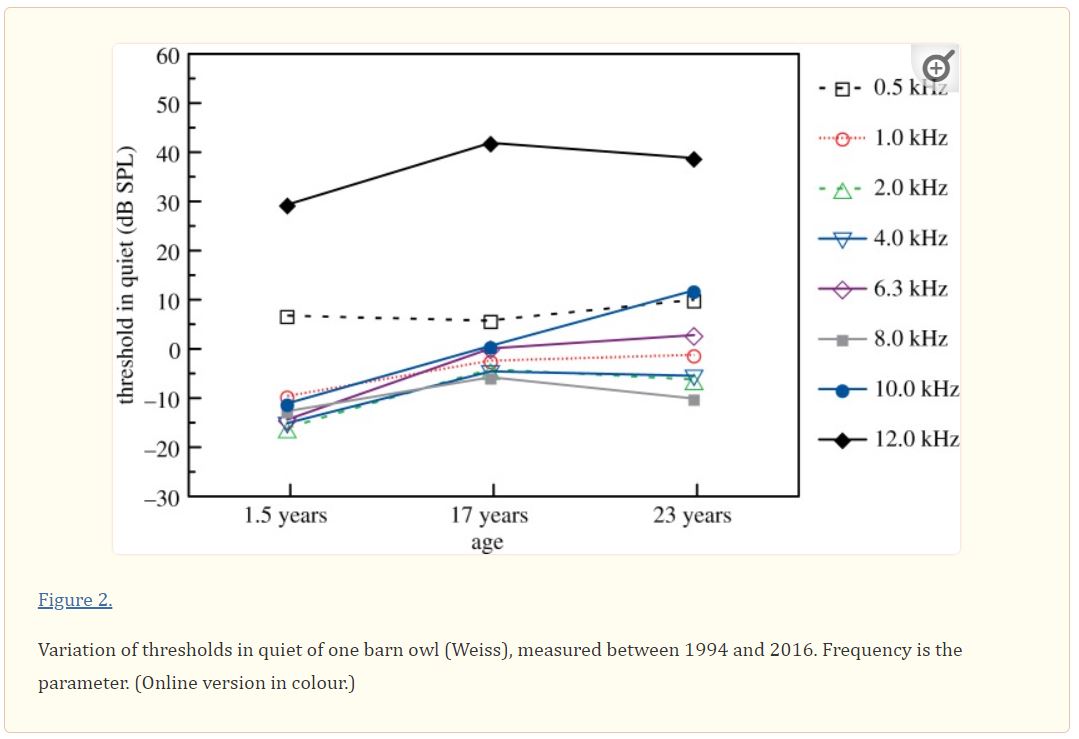
Typical age-related hearing loss in mammals leads to a threshold (range of volumes and frequencies they can hear) increase of 20-40 decibels, while even over the course of a very long-lived owl’s life, the increase was only 4-10 decibels. While many owls die early, this shows it is not due to hearing degradation related issues. While the majority do not live longer than 3-4 years, it is not rare to find ones 10-20 years of age.
While younger owls were as a group more sensitive to sound that the old owls, it was by less than 3 decibels different in threshold. Overall statistical testing showed no significant difference in hearing ability between the two groups.
Other experiments over the years have shown pigeons, chickens, finches, budgies, European starlings, quails, and more have all been able to regrow hairs of the basilar papilla removed chemically in about 4-6 weeks with no significant loss in original hearing ability. Physical damage to the hairs by acoustic trauma (hitting them with high pressure sound waves to break them by vibration) yielded very similar regrowth and regaining of hearing to a remarkable degree.
The ability to regrow these hairs seems to be key to this amazing ability of birds as had been previously hypothesized due to testing on some of those other birds. Further study of this process will hopefully help us to find treatments to help us in the future to treat this widespread issue of humankind. While most of us will eventually suffer from some extent of hearing loss, it is something most birds will never have to deal with, no matter how long they live. Hopefully in the future, we will learn their secret and share in the joy of a long life full of vibrant sound.

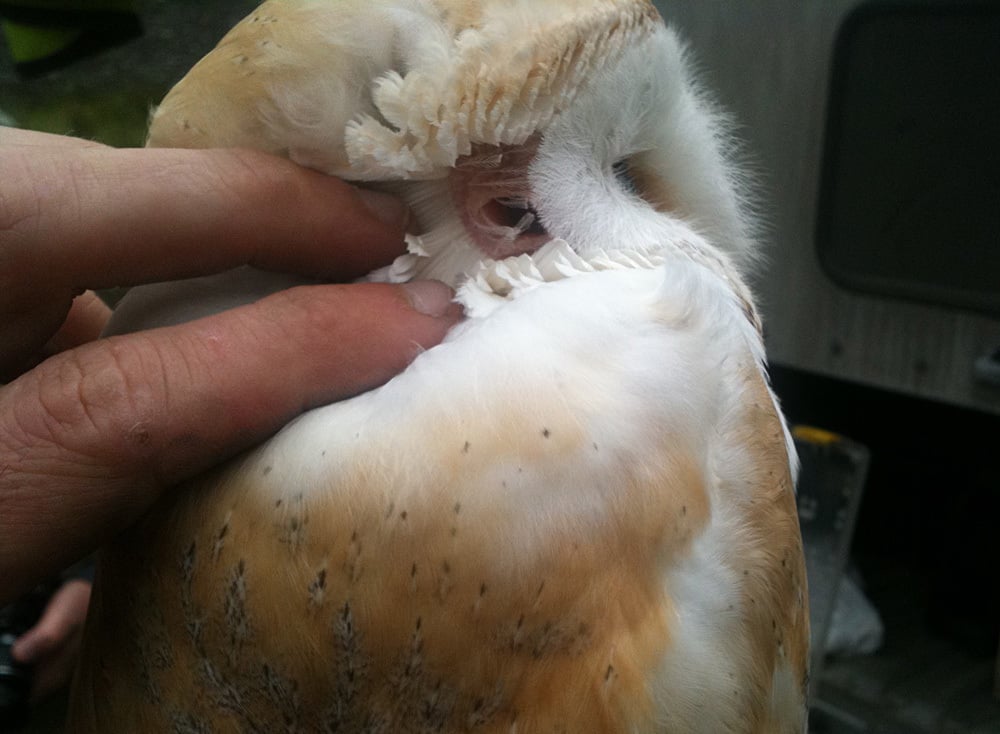
Here’s where the ears are. In many owls, since their eyes are both so big and so long, you can see the back of the eye from the ear canal.
Amazing! I really hope we can leverage what we learn here (pun intended) to treat hearing loss in humans. I can tell you from what I know that there are also several important human medications that are known to cause or exacerbate hearing loss.
And hearing loss in older humans is associated with lower levels of social contact and higher levels of dementia. So the problem in humans is way more significant than just the sensory loss.
I didn’t know there were medicines that could make you lose your hearing. That’s a pretty significant side effect. As you said, we take hearing for granted, but it ties into many aspects of our lives. We’re gregarious creatures that need to be interacting with others to be fully healthy.
Yeah, it’s usually dependent on concentration, so really high doses and/or administering via IV too fast. That can be mitigated with careful monitoring and dosing procedures. But there are some big guns like amphotericin (antifungal), and chemo meds that can be ototoxic at any dose. Sometimes reversible, sometimes not. But if you’re in need of any of those, you’re officially in the realm of choosing the least bad option to sustain your life.
It’s not super common. But it is something we watch out for.
I was just talking to the GF about it and she said in trauma the one day she remembered a PA telling a nurse to be careful with Lasix in an IV as pushing that too fast can cause hearing loss too. It’s strange I’ve never heard of it since it sounds much more common than I would have thought.
Yeeeeeeep! IV Lasix is the one I deal with most often. Like I said, it’s concentration dependent. That’s why how fast you push it matters. Some tissue in the lining of the ear is similar to tissue in the kidney that responds to Lasix apparently? I read about it briefly just to confirm it’s a real thing and not just an urban legend. Bodies are absolutely bizarre.
I’m just in the habit of never pushing any IV medication fast. There’s almost never a need for it, and the risks aren’t worth the miniscule amount of time you save.


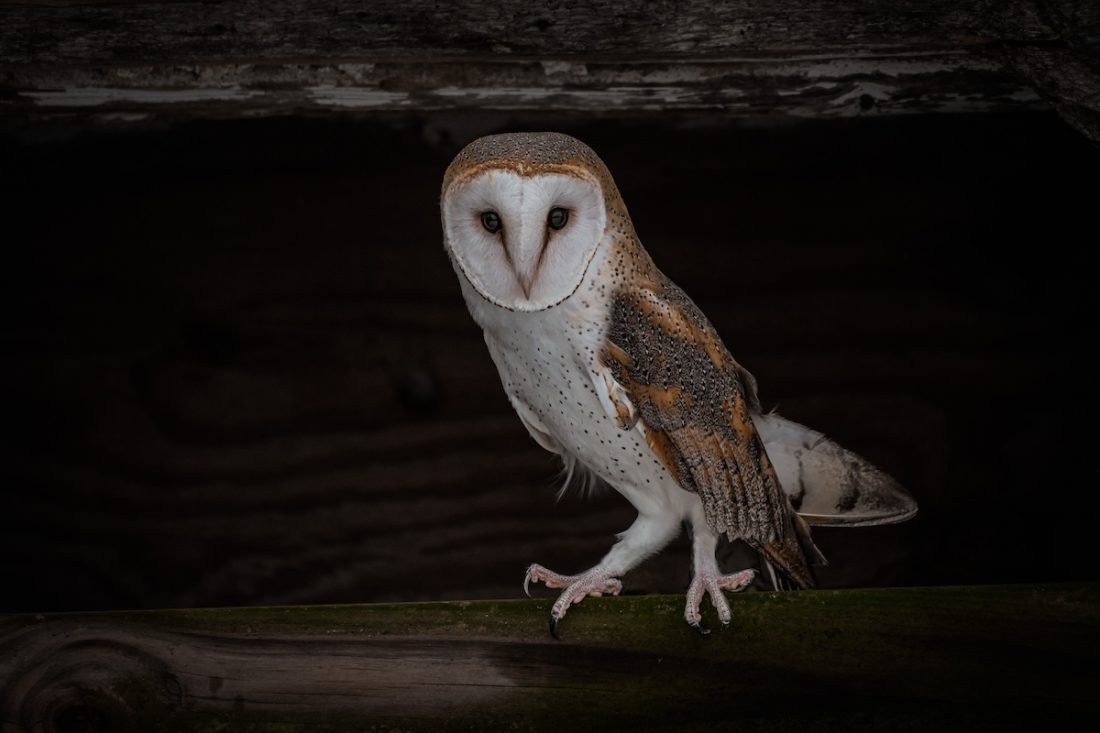
How do you delete something from the Internet?
No love for owl ear apertures?
Some have an operculum, a flapper valve that covers the aperture. This is the same structure on a fish’s gill or a snail’s trap door on it’s shell.
Owl ears are really amazing things, even if they look a bit odd.
Haha. They’re cool in their function. I just don’t like the look of the hole in the head. Quite interesting about the valve though, I had no clue. Thanks for sharing.
Aww, I thought the little adorable feathers would overcome any trypophobia.
I’m glad I was still about to provide some positive but for you at least!
Not your fault at all. Those feathers were cute, and seeing owls and ears in the title, I knew the potential outcome (after seeing crow/raven ears some time ago). I was just being dumb with the original comment haha. I should have thanked you for the original post as well, very informative.
Oh, good!
I seldom receive actual dislike for things I post, but it does happen every so often.
I’m glad I didn’t taunt you with a pic of the operculum then! 😜
